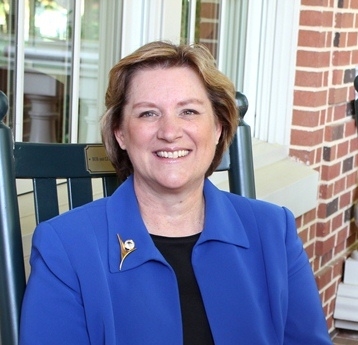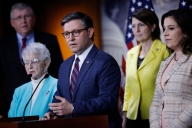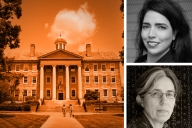You have /5 articles left.
Sign up for a free account or log in.

Debra M. Townsley
William Peace University
When the president of William Peace University, Debra Townsley, announced on Monday her plans to retire next summer, the reaction was starkly mixed.
The Board of Trustees lamented her departure, calling Townsley a transformative president of the university in Raleigh, N.C., that became co-ed during her tenure. But some students, faculty and alumnae cheered vigorously.
“We alumnae have been waiting for this announcement for a long time,” said Miriam Dorsey, a 1964 graduate of Peace who is president of an alumnae group called Preserving Peace College’s Legacy, which has been critical of Townsley. “During her tenure, Debra Townsley has managed to alienate the faculty, staff, students, alumnae and contributors – no one can run a university that way.”
Board of Trustees Chairwoman Beth Cherry took an opposite view. The board recently offered to extend Townsley’s first five-year contract, but Townsley turned down the offer and will leave next summer.
“The board is very sad that she has decided to do that,” Cherry said.
She called Townsley a president with a good legacy – she turned the college co-ed, changed its name and branding, and led it through reaccreditation and increased enrollment.
But as the college's enrollment grew, the number of full-time faculty decreased, according to a letter the majority of faculty members backed and sent anonymously to the board this spring. From 2010, the year Townsley arrived, to fall 2013, enrollment grew from 687 full-time students to 823, while the number of full-time professors dropped by nearly half, from 45 professors to 24. Meanwhile, the number of adjunct faculty shot up, from 32 to 75.
Some of the remaining faculty members – who have been reluctant to return phone calls or speak on the record – were offered a $30,000 buyout this year, provided they agreed not to criticize the university after they left.
The spring letter from faculty, a public expression of the internal frustrations among professors at Peace, is strongly worded. Under Townsley, those faculty wrote, Peace had become a university “driven by mediocrity, suspicion, and fear, a university desperate for tuition dollars but entirely unwilling to provide students with the support and encouragement they need to complete their degrees.”
The letter raised specific concerns, too: about poisonous spiders on campus, transcripts lying around on the floor, and students who could not get their transcripts or even learn if they had graduated. In an interview, a student said the final weeks of the spring semester were chaotic because of questions about which students were eligible to graduate. A university spokesman said he knew of nothing out of the ordinary.
Cherry, the board chairwoman, dismissed the letter, citing its anonymous nature.
“I was in meetings with the faculty – no one knew anything about the letter, so I cannot respond to that,” she said.
She also challenged the idea that there was widespread criticism of Townsley.
The university, which critical alumnae still refer to as “Peace College,” was founded in the 1870s and for most of its history was a two-year women’s college. In the 1990s it added four-year degrees.
In summer 2011 – a year after Townsley arrived at Peace from Nichols College in Massachusetts -- Peace officials announced two big decisions: the college would begin admitting male students and it would change its name. The move and the way it was handled surprised some alumnae.
Alumnae have said their discontent has less to do with the admission of male students than with what they see as a diminution of the quality of the institution.
Townsley, in her retirement announcement this week, called herself a “change agent.” But some have wondered whether she might have been able to change Peace without upsetting so many people.
“Not being there, I think some folks accepted that Peace’s future was coeducational but were not happy with the process by which it was decided,” said Kent Chabotar, the recently retired president of Guilford College, in North Carolina.
Chabotar, who also teaches seminars to higher ed leaders, including new presidents, said campus chiefs can dictate decisions or allow others to participate.
Even if either method would reach the same conclusion, a president’s decision-making style might make all the difference.
“If you’re popular and results are bad, you get away with it; if you’re unpopular and results are good, you get away with it; and if you’re unpopular and the results are bad, you’re in trouble,” Chabotar said.
At least among Peace’s board, there’s no indication Townsley was held in anything but the highest regard, despite the faculty letter, student protests earlier this year, and some alumnae who said they stopped donating because of Townsley’s stewardship of the university.
But the elation of some who attended the university was evident: The News & Observer of Raleigh, which has been doggedly reporting on the university, posted a photo of the campus after Townsley announced her retirement plans: It shows one former and one current student tossing roses into a campus fountain to celebrate the news.
In an email, Hannah Murphy, who graduated earlier this year, called Townsley’s impending departure a “huge step in the right direction.”
In an interview several weeks earlier, Murphy, who helped organize student protests last spring before she graduated, said students had been trying to open the board’s eyes to the “chaos” at Peace, but to no avail.
“Nothing happens,” said Murphy, who was a graduation speaker and held the honorary title of Miss Peace, “so they made very clear that student opinions and student concerns don’t mean anything to them.”
Cherry, the board president, dismissed the protests in an interview Tuesday. Protests, she said, are a part of college life and a part of education.
Murphy agreed to be interviewed earlier this year only after she had graduated, because she feared retribution by the administration.
“There is no one there to keep them in check,” she said. “I was terrified that unless I had the diploma in my hand, they would try to do something. Whether that’s true, I don’t know, I’m sure they would deny every second of it.”
In another earlier interview, a recent graduate named Rubi Hernandez, who had been student government president when she was at Peace, said she and other students also had concerns about Townsley.
Hernandez said she took some of those concerns to Townsley during one of the monthly meetings she and other student leaders had with the president. Hernandez said Townsley’s response prompted Hernandez to leave one meeting early “almost in tears.” The president, Hernandez said, “belittled our concerns and the fact that we have issues with the changes in the university.”
Students and faculty members have expressed concerns that some of the new students being admitted to Peace are not of the same academic caliber as in the past.
Hernandez, who led student orientations, remembers one orientation session where students were supposed to say adjectives before their names. One exchange made her wonder about some students’ readiness for college.
“This one girl said, ‘Banana Brooke,’ and I said, ‘Banana is a noun’ – just little things like that,” said Hernandez.
Susan Resneck Pierce, president emerita at the University of Puget Sound and a higher ed leadership consultant (and frequent contributor to Inside Higher Ed), said boards might do well to bring in someone periodically from the outside to give a third-party reading of how a president is doing.
“Normally on the one hand, people don’t like to credit anonymous letters, but how does a board know how well a president is doing?” she said.
In their spring letter, the faculty acknowledged there were two sides to the story, but they said Townsley’s side was warped.
“Undoubtedly President Townsley tells and will continue to tell a different story -- one in which selfish faculty do not appreciate the sacrifices that we are all making for the good of the university,” the letter said. “In the narrative that the president has presented to us repeatedly, everyone at Peace except the administration must be blamed for getting in the way of bold and unpopular decisions that must be made to get through this tumultuous period.”
Dorsey, the president of the alumnae group that is critical of Townsley, said she hoped to work with the board in the future to heal the relationships among campus constituents.
Cherry, the board president, said the board had tried, at one point, to reach out.
“At the very beginning we did reach out, we explained, we tried – they chose to continue to believe as they wanted to believe,” Cherry said.








